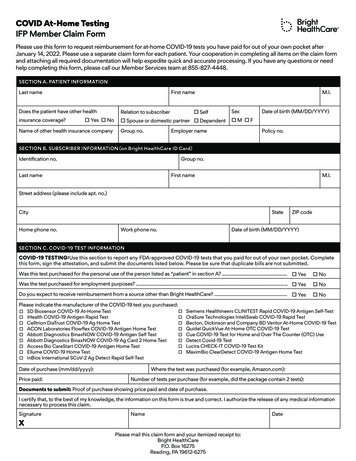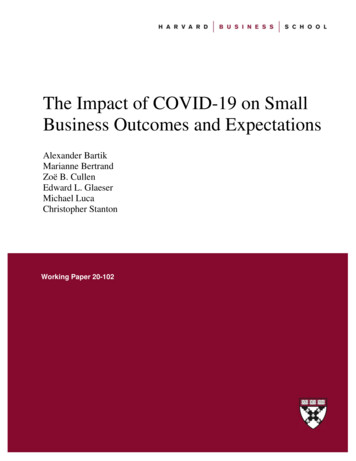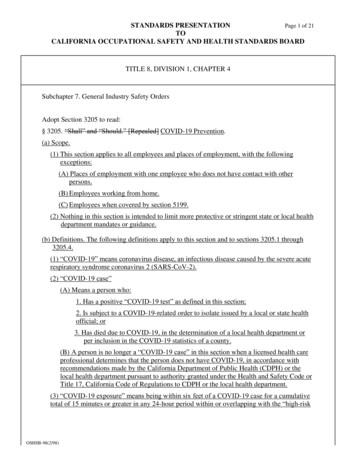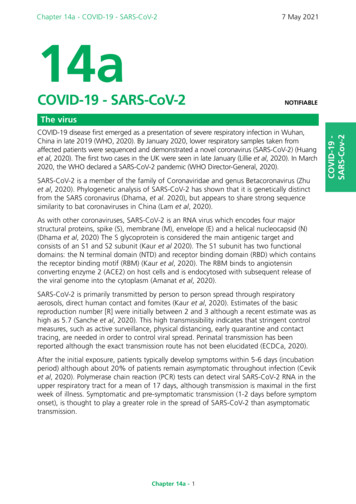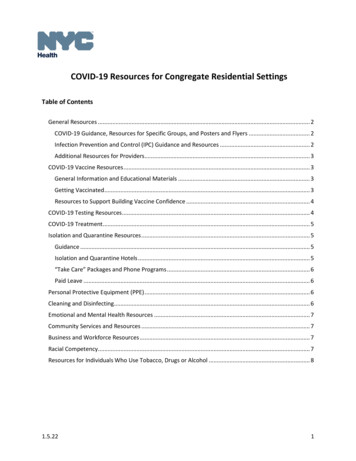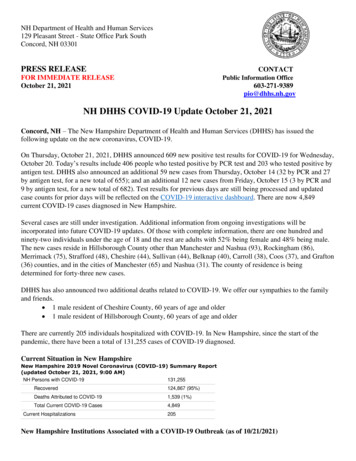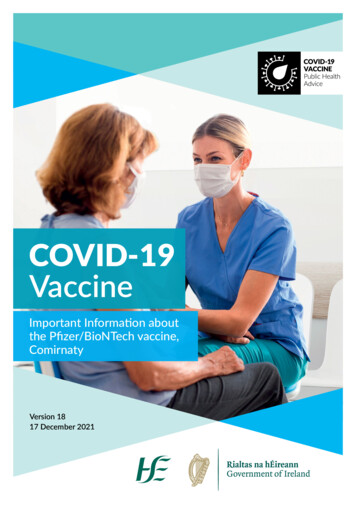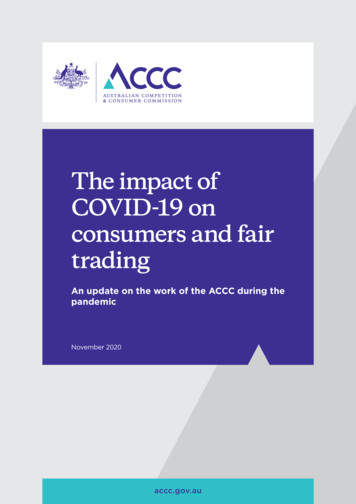
Transcription
The impact ofCOVID-19 onconsumers and fairtradingAn update on the work of the ACCC during thepandemicNovember 2020accc.gov.au
Australian Competition and Consumer Commission23 Marcus Clarke Street, Canberra, Australian Capital Territory, 2601 Commonwealth of Australia 2020This work is copyright. In addition to any use permitted under the Copyright Act 1968, all material contained within this work is providedunder a Creative Commons Attribution 3.0 Australia licence, with the exception of: the Commonwealth Coat of Arms the ACCC and AER logos any illustration, diagram, photograph or graphic over which the Australian Competition and Consumer Commission does not holdcopyright, but which may be part of or contained within this publication.The details of the relevant licence conditions are available on the Creative Commons website, as is the full legal code for the CC BY 3.0 AUlicence.Requests and inquiries concerning reproduction and rights should be addressed to the Director, Content and Digital Services, ACCC,GPO Box 3131, Canberra ACT 2601.Important noticeThe information in this publication is for general guidance only. It does not constitute legal or other professional advice, and should not berelied on as a statement of the law in any jurisdiction. Because it is intended only as a general guide, it may contain generalisations. Youshould obtain professional advice if you have any specific concern.The ACCC has made every reasonable effort to provide current and accurate information, but it does not make any guarantees regardingthe accuracy, currency or completeness of that information.Parties who wish to re-publish or otherwise use the information in this publication must check this information for currency and accuracyprior to publication. This should be done prior to each publication edition, as ACCC guidance and relevant transitional legislationfrequently change. Any queries parties have should be addressed to the Director, Content and Digital Services, ACCC, GPO Box 3131,Canberra ACT 2601.ACCC 11/20 20-58www.accc.gov.au
ContentsExecutive Summary21.Background42.ACCC COVID-19 Taskforce intervention approach53.Complaints analysis63.1Number of contacts received63.2Type of reports received64.5.iiiACCC in action—Interventions in the travel sector84.1Background84.2Taskforce activities and interventions84.3Conciliation involving travel and consumer hardship cases94.4Ongoing travel issues9ACCC in action—Interventions in other sectors115.1Fitness115.2Ticketing/events125.3Price increases and supply shortages125.4Small business issues/franchising135.5Professional and local sports145.6Scams145.7Other activities156.Future issues and next steps167.Further resources/contact us17Appendix A—Taskforce travel intervention case studies18Appendix B—Other Taskforce activities23The impact of COVID-19 on consumers and fair trading
COVID-19 activities snapshot1 January to 31 October 2020TYPES OF COMPLAINTS RECEIVED74.8%Consumer109,446*COMPLAINTS16.9%Scams (loss sufffered)4.8%0.6%2.9%CompetitionProduct safetySmall businessAREAS WITH GREATEST COMPLAINT GROWTH FROM 2019 497% 134%1Travel4,0522019 121%23Sport & recreation24,21020209992019Fuel retailing2,33953720202019Closely engaged with 113 businesses,including 50 travel businesses, regardingissues or conduct of concern impactinghundreds of thousands of consumersResponded to over 350 media queriesand conducted over 170 media interviews*11,1882020Released 3 key COVID-19guidance publications forconsumers and industry:1Consumer guidance viewed morethan 345,000 times2Business guidance viewed more than55,000 times3Travel industry best practice guidancedownloaded more than 2,900 timesThese figures exclude over 20,000 complaints that did not raise concerns under the Competition and ConsumerAct 2010 (Cth), and scam reports that did not involve any loss being suffered.The impact of COVID-19 on consumers and fair trading
Executive SummaryThe COVID-19 pandemic has significantly disrupted the domestic and global economy. As the nationalcompetition and consumer law regulator, the Australian Competition and Consumer Commission(ACCC) has had a significant role in assisting Australian consumers and businesses deal with the effectsof COVID-19.In recognition of the continuing issues likely to be faced by consumers and small business as Australiaemerges from the pandemic, the ACCC has prepared this report based on its experience to date, and tooutline its proposed priorities and activities going forward.In response to the pandemic, the ACCC adjusted the focus of its compliance and enforcement activitiestoward prioritising competition and consumer issues arising from COVID-19. To facilitate this, an internalCOVID-19 Taskforce was established to address, to the extent possible, immediate harm to consumersand small business arising from the pandemic.The ACCC also collaborated closely with state and territory Australian Consumer Law (ACL) regulatorsand other government agencies regarding COVID-19 issues.Our primary approach has been to educate consumers and businesses about their rights andobligations. Additionally, we have been engaging directly with businesses in a collaborative mannerand at an earlier stage, with the primary purpose of seeking to understand and resolve issues throughpragmatic solutions. Our approach has sought to achieve prompt changes in businesses’ behaviourand redress for impacted consumers in the most efficient way possible, rather than seeking compliancethrough court-based outcomes.The majority of COVID-19 related consumer reports we have received concern the travel industry.These reports have increased by 497% in the period January to October 2020, compared to the sameperiod in 2019. This is unsurprising given the immense impact that domestic and international travelrestrictions, and the subsequent cancellation of travel bookings, have had on both consumers andtravel businesses. The situation with respect to travel cancellations has been complicated further by themajority of travel insurance products excluding cancellations resulting from the pandemic.To prevent potential widespread and significant detriment to consumers and travel businesses as aresult of these issues, the Taskforce primarily focused its efforts on addressing travel-related concerns.To achieve this, the Taskforce engaged directly with around 50 travel businesses to effect behaviouralchange on issues impacting hundreds of thousands of Australian consumers. In many instancesthis engagement resulted in travel businesses changing their approach to ensure they were offeringconsumers refunds or other remedies for cancelled travel in accordance with their entitlements underthe terms and conditions of their contract.The ACCC recognises that many businesses in the travel sector have assisted consumers byimplementing hardship policies and providing refunds for those consumers in exceptional circumstancesof health or financial hardship. Unfortunately, other businesses have been less willing to accommodatehardship claims.Beyond the travel sector, the Taskforce has conducted industry engagement, compliance andeducation initiatives with over 60 businesses from a range of other sectors including live performanceand ticketing, fitness and gymnasiums, online selling platforms, local and community sports,professional sports, supermarket retailers and food suppliers.As a result of the pandemic, many businesses were forced to make substantial changes to theiroperations. This was coupled with significant uncertainty about their future viability. Concerns wereraised by small business about misconduct by larger businesses that they supply to or acquire servicesfrom. These allegations of misconduct related to leasing issues, pressure for retail stores and franchisesto open in a COVID-19 environment and a lack of relief regarding the payment of fees by small businessdespite economic hardship.As the primary competition regulator in Australia, the ACCC is closely monitoring key markets andindustries to determine the impact of the pandemic on competition in the economy. The ACCC’s2The impact of COVID-19 on consumers and fair trading
COVID-19 Taskforce continues to investigate reports of anti-competitive practices and allegedcontraventions of the fair trading provisions affecting the small business sector.The pandemic will have a long-term impact on a number of businesses, and entire industries. Whilst theACCC’s COVID-19 Taskforce has been able to achieve a number of outcomes on behalf of consumersand businesses to date, this work will continue as issues persist. In the future as economic activityincreases and restrictions ease, the ACCC will also need to ensure that there is ongoing compliance withAustralia’s competition and consumer laws.Throughout our engagement with businesses, the ACCC has been conscious of the impact of thepandemic on economic viability. At the same time, we are also conscious that many consumershave suffered significant financial hardship. Where appropriate, the ACCC has therefore encouragedconsumers and businesses to engage fairly during this period. However, businesses still need to complywith their legal obligations, and work to maintain the confidence of their customers by addressinglegitimate consumer concerns and requests for assistance. Failure to do so may tarnish the reputationand viability of businesses in the long-term.3The impact of COVID-19 on consumers and fair trading
1.BackgroundThe ACCC’s purpose is to make markets work for the benefit of consumers, business and thecommunity. The ACCC seeks to achieve this by taking action that promotes the proper functioning ofAustralian markets, protects competition and improves consumer welfare. The ACCC also seeks to stopconduct that is anti-competitive or harmful to consumers.During COVID-19, however, the role of the ACCC has taken on added significance. The pandemic hasdisrupted global and domestic markets so significantly that it has completely changed the economiclandscape. Many Australian businesses are struggling to remain financially viable, particularly smallbusiness, and the future is uncertain for many. Consumers have also experienced wage or job losses,placing them in financial hardship.Given the significant impact of COVID-19 on business and consumers, the ACCC publically announcedin March 2020 that it would be adjusting the focus of its regulatory activities to prioritise consumer andcompetition issues arising from the impact of COVID-19.This priority shift led the ACCC to alter its day-to-day operations and direct a proportion of its resourcesto COVID-19 specific work streams, including establishing an internal ACCC COVID-19 Taskforce toaddress immediate harmful consumer and small business problems arising from the crisis.The Taskforce has also been working closely with other state and federal government agencies andregulators to share information and coordinate COVID-19 related activities. For example, the ACCC hasbeen liaising regularly with:4 state and territory ACL regulators, and the New Zealand Commerce Commission, on consumerprotection issues the Australian Securities and Investments Commission (ASIC) regarding issues relating to financialproducts including insurance the Therapeutic Goods Administration (TGA) on potentially false or misleading COVID-19 specificproduct claims the Department of Health regarding private health insurance as well as personal protectiveequipment supply chain issues.The impact of COVID-19 on consumers and fair trading
2.ACCC COVID-19 Taskforceintervention approachThe ACL is not able to resolve all consumer issues arising from the cancellation of services due togovernment restrictions. Consumers’ rights under the consumer guarantees provisions in the ACL arerestricted in their application when a business is unable to meet its consumer guarantee obligations dueto the actions of a third party, such as when government restrictions prevent the business from fulfillingits obligations. Where the consumer guarantees do apply, the outcome will vary depending on theindividual circumstances of each situation.In general, whether consumers are entitled to a credit note or a refund for services cancelled due togovernment restrictions will therefore depend on the terms and conditions of their booking.However, consumers may also have other remedies outside of the ACL, for example where a contractis held to be frustrated. While the ACCC does not have the power to enforce contractual terms or seekremedies for frustration on behalf of consumers, some State and Territory ACL regulators may provideguidance or conciliate disputes involving State legislation relating to frustration.Although the consumer guarantee provisions are restricted in their application in these circumstances,the Taskforce has been investigating, and will continue to investigate, common types of COVID-19related misconduct which do raise concerns under the ACL. These include: businesses misleading or deceiving consumers about their rights or entitlements to a refund or otherremedy under the terms and conditions of their contract businesses misleading or deceiving consumers by seeking to deduct cancellation fees, or othercosts, from refunds or other remedies when there is no contractual basis to do so businesses seeking to unilaterally impose and/or rely on unfair contract terms in their standard formcontracts with consumers or small business businesses engaging in misleading or deceiving conduct, or making false or misleadingrepresentations in advertising or marketing material about the provision of future goods or services businesses taking or seeking payment for goods or services when there are reasonable grounds tobelieve the goods or services won’t be supplied businesses taking payment without prior consent for services that are materially different from theservice that the consumer originally contracted for with the business.The Taskforce has focused its efforts on engaging with industry representatives and over 100 individualbusinesses in relation to these issues to understand their position, advise of their obligations and,if necessary, encourage changes to their approach. This engagement has resulted in hundreds ofthousands of Australian consumers receiving the remedies they are entitled to under the terms andconditions of their contract.The Taskforce is aware that many businesses have been struggling to process high numbers ofcancellations and respond to consumer queries during COVID-19. This difficulty has been heightenedby both the financial impact of the pandemic and social distancing restrictions, leading to businessesclosing call centres, implementing working from home arrangements or reducing staff capacity.Despite these difficulties, the ACCC encourages businesses to review their communications, particularlyregarding consumer entitlements to remedies, and make improvements where necessary. In additionto benefiting consumers, early and effective communication serves to protect business interests.For example, when communication from a business is poor, consumers are more likely to reporttheir concerns to a regulator or their local Member of Parliament. Some consumers may also seek torecover costs from the business by lodging a Tribunal claim. By the time the matter reaches this point,businesses need to expend greater resources to resolve the dispute than if they had effectively engagedwith their customers in the first place.5The impact of COVID-19 on consumers and fair trading
3.Complaints analysis3.1Number of contacts receivedThe ACCC has received a significantly higher number of contacts to date in 2020 compared to 2019.1The vast majority of these contacts have raised consumer ACL concerns or issues (almost 75% of totalcontacts received).Contacts started to rise significantly in March 2020 (almost a 60% increase compared to March 2019),with the biggest increase occurring in April 2020 (almost a 103% increase compared to April 2019).During May to July 2020 contacts were about 40-60% higher than this period last year, although thesefigures have started to stabilise in recent months.Figure 1 shows the number of contacts received by the ACCC (excluding scams) from 1 January to31 October 2020, compared to the same period in 2019.Figure 1:Contacts received in 2020 compared to 2019 (excluding 0Jan3.2FebMarAprMayJun20192020JulAugSepOctType of reports receivedTop ten reported industriesFigure 2 shows the top ten industries with the greatest increase in contacts from 1 January to31 October 2020, compared to this period last year. It demonstrates that there has been a significantincrease in the number of contacts received about the tourism/accommodation industry ( 589%) andair/sea passenger transport industry ( 358% increase) to date in 2020, compared to 2019.There were also noticeable increases in the number of contacts received about fuel retailing ( 121%),pharmaceutical ( 86%), supermarket/grocery sectors ( 60%), due to concerns raised about the price ofthese goods, and any significant price increases, during the pandemic. The increases in contacts aboutthe sport and recreation sector ( 134%), insurance sector ( 104%), hardware and outdoor equipment( 41%), real estate sector ( 34%) and other store based retailing (31%) is also reflective of the particularimpact that COVID-19 had on the operation or viability of these sectors.261‘Contacts’ includes both enquiries and reports received by the ACCC.2Personal protective equipment, including face masks, are commonly sold in hardware and outdoor stores which means thatprice related complaints about these products may also have been associated with these stores during the pandemic.The impact of COVID-19 on consumers and fair trading
Concerns have also been raised by consumers regarding their ability to claim on travel insurance forcancelled travel, as well as limitations in accessing non-essential services under private health insurancehospital and extras cover due to COVID-19 restrictions. Most financial products including travelinsurance fall within ASIC’s jurisdiction and the ACCC has been liaising with ASIC regarding these travelinsurance issues.While being in the scope of state and territory regulators’ jurisdiction, the ACCC also receivedsubstantial numbers of reports regarding residential and commercial real estate. These reports largelyrelated to difficulties in negotiating rent reductions where tenants are experiencing financial hardship.The retailing sector was greatly impacted by physical store closures.Figure 2:Top ten industries with greatest increase over 2019 contactsTourism & accommodation589%Passenger transport - air & sea358%Sport & recreation134%Fuel retailing121%Insurance104%Pharmaceutical & cosmetics86%Supermarket & grocery60%Hardware & outdoor equipment41%Real estate34%Other store based retailing31%02,0004,0006,00020197The impact of COVID-19 on consumers and fair trading8,000202010,00012,00014,00016,00018,000
4.ACCC in action—Interventions in thetravel sector4.1BackgroundThe highest volume of COVID-19 complaints were received about travel issues. From 1 January to31 October 2020, the ACCC received 24,210 travel-related complaints, compared to 4,052 complaintsfor this period in 2019 ( 497% increase). The majority of travel complaints were about travel agenciesand airlines.The volume of travel complaints received reflects the extraordinary impact that domestic andinternational travel restrictions, and the subsequent cancellation of travel bookings, have had on thetravel sector as well as consumers.Further, following the announcement of these travel restrictions, the ACCC also received a high volumeof travel-related queries from journalists about consumer entitlements to remedies for cancelled travelservices. These queries often focused on the conduct and policies of specific companies; for example,cancellation fees charged by Flight Centre for cancelled bookings.As the pandemic continued, there was an increase in complex and nuanced queries such as refunddelays. There were also concerns raised about certain travel businesses going into administration, suchas STA Travel and Virgin Australia, and the potential impact this might have on consumers who hadreceived credits or were yet to receive refunds.4.2Taskforce activities and interventionsAs noted previously, the taskforce has engaged with multiple businesses in the travel sector. Whilesome of these outcomes have been announced publically, including Flight Centre, Qantas and Etihad,the majority of resolutions have been obtained through quick confidential intervention and engagementwith the business in question. The case studies at Appendix A illustrate some of the other outcomes wehave achieved for consumers, both from travel service providers and third party intermediaries.In March 2020 the ACCC published guidance for consumers relating to COVID-19 travel cancellations.This was updated on a continuing basis as issues arose. In July 2020, the ACCC and state and territoryACL regulators also released Best Practice Guidance for the travel industry, which sets out forbusinesses their legal obligations and outlines how to appropriately deal with consumers regardingCOVID-19 cancellations.The ACCC recognises the complexity of issues arising for both consumers and the travel industrybecause the legal position may depend on the circumstances of each case. Complicatingfactors include:8 the limited application of the consumer guarantees in circumstances where businesses havecancelled services due to government restrictions. This means that the terms and conditions ofconsumers’ travel bookings, and contract law, are relevant to determining consumers’ rights in thissituation the complex operating models of many travel businesses, which often involve third partyintermediaries, such as a travel agent or tour operator passing funds paid by the consumer to anumber of primary travel suppliers (such as airlines, accommodation or cruise providers). Thiscreates added complexity for consumers in recovering funds for cancelled services, as their ability todo so will depend not only on their terms and conditions with their travel suppliers but also with theiragent or tour operator. This situation becomes more complex where multiple contracting parties areinvolved; for example, where a travel agent utilises an online booking platform to book flights for aclientThe impact of COVID-19 on consumers and fair trading
the limited protections of travel insurance policies which commonly exclude force majeure events,such as pandemics. As a result, the consumers’ only recourse is to attempt to recover funds forCOVID-19 related travel cancellations from travel agents and suppliers directly.4.3Conciliation involving travel and consumerhardship casesThe ACCC is not a complaints handling body, and therefore it rarely becomes involved in individualconsumer disputes. State and Territory ACL regulators, however, play an important role in facilitatingdispute resolution between consumers and traders in relation to goods and services covered bythe ACL.While the ACCC does not conduct individual dispute resolution, in our COVID work we haveon numerous occasions facilitated the conciliation of consumer disputes as part of our ongoingengagement with businesses.In our dealings with businesses across different sectors, the ACCC has consistently outlined itsexpectations that businesses should take into account individual consumers’ circumstances. This meansthat in some cases the ACCC considers that businesses should consider requests for refunds, evenwhere they are only obligated to provide credits under their terms and conditions. This includes where: consumers are unlikely to be in a position to use a credit before its expiry consumers may not be able to utilise a service while there is still any risk of COVID-19, for example,travel if they are immuno-compromised the reason the service was booked was to attend an event that due to its nature was a one-off eventnot capable of being carried out again.consumers are experiencing financial hardship as a result of the COVID-19 pandemic (for examplethrough loss of, or reduced, employment)In relation to issues of hardship, the ACCC has received a mixed response. Some businesses havedemonstrated best practice by diligently applying hardship policies in considering requests forremedies, despite the business also struggling financially during COVID-19.An example of such best practice conduct was demonstrated by an airline which introduced acomprehensive hardship policy to provide consumers with refunds for cancelled flights if the consumercan demonstrate medical, financial or other genuine hardship. The airline introduced this policy despiteonly being required under its terms and conditions to provide credits to consumers for cancelled flights.The airline also took a pragmatic approach to the proof required for hardship.In other cases, we have seen businesses being inconsistent in their consideration of hardship cases, bygoing above and beyond their contractual obligations to provide fair outcomes for some consumersfacing hardship or other extenuating circumstances, while treating other consumers in similar situationsless favourably. Some of these businesses have demonstrated significant improvement in theirconsumer response after ACCC intervention.4.4Ongoing travel issuesThe Taskforce has observed that certain other travel booking issues have emerged as the COVID-19situation has changed, but the pandemic continues to impede both domestic and international travel.These issues include: 9travel restrictions at the destination being lifted, but local travel restrictions preventing consumersfrom leaving their home state or country. Added complexities may arise where a consumer hasbooked flights, accommodation, and extras like tours via separate providers (including travelagents), each with their own terms and conditions around cancellations and refunds. If the travelcompany is based in another country, the laws of that country might apply, adding furthercomplexityThe impact of COVID-19 on consumers and fair trading
consumers anticipating, based on comments from politicians and experts, that travel restrictions willcontinue for some time yet, but travel providers have not yet cancelled their booking as the status ofrestrictions for the planned travel period is not yet certain.The ACCC is continuing work to understand the legal obligations of travel providers in these complexscenarios, so that it can provide accurate guidance and support to consumers and small business asrequired. However consumers’ entitlements and businesses’ rights and obligations in these instances willdepend on the specific circumstances in each case. We will continue to monitor these issues and takeany necessary action where we identify systemic problems.The ACCC and ACL regulators also remain concerned about the approaching expiration date of somecredit vouchers provided to consumers for cancelled bookings earlier in the year. The ACCC and ACLregulators’ best practice guidance for the travel industry sets out that businesses should be preparedto extend any credit note expiry period to take into account the extension of any travel restrictions,to allow consumers a reasonable period in which to use the credit after the COVID-19 restrictions arelifted, or to otherwise receive a refund. Alternatively, businesses may provide credit notes with no expiryperiods, or expiry periods that do not start to run until after the COVID-19 restrictions are lifted.10The impact of COVID-19 on consumers and fair trading
5.ACCC in action—Interventions inother sectors5.1FitnessSimilar to the travel sector, the fitness and gyms sector has been particularly impacted by governmentrestrictions implemented in response to COVID-19.The mandatory gym closure period which came into effect on 23 April 2020 led to a significant increasein queries and complaints from consumers. The most common issues raised by consumers relatedto gyms or fitness providers continuing to deduct ongoing membership or freeze fees from memberaccounts during the closure period, without obtaining prior consent to do so. This conduct by somefitness providers would contravene the prohibition under the ACL which prevents businesses fromtaking payments for goods or services when there are reasonable grounds to believe the services won’tbe supplied.Other common complaints related to gyms or fitness providers: Charging freeze fees where they did not have a contractual basis to do so; for example, wherethe gym or fitness provider charged freeze fees during the closure period but was only entitled tocharge these fees under the contract where the consumer elected to freeze their membership. Charging consumers for access to ‘online membership’ services during the closure period, which theconsumer did not wish to access and had not consented to pay for.The ACCC quickly responded to these complaints using a combined approach of industry educationand engagement and compliance activities which included: contacting large national fitness groups and gyms to raise concerns regarding their activities, whichresulted in a change in behaviour publishing guidance for consumers and businesses relating to gym and fitness industry issues on theACCC website engaging with major third party payment processing companies for gyms and fitness providers tounderstand the compliance measures they had implemented to avoid processing payments withoutconsumers’ consent.This intervention resulted in the vast majority of gym facilities, fitness providers, and third partypayment processors ceasing to charge members for services during this period unless they had themembers’ prior consent. Many members who were charged by gyms or fitness providers during thisperiod, where they did not
COVID-19 Taskforce was established to address, to the extent possible, immediate harm to consumers and small business arising from the pandemic. The ACCC also collaborated closely with state and territory Australian Consumer Law (ACL) regulators and other government agencies regarding COVID-19 issues.



